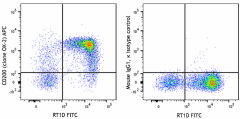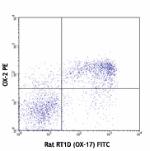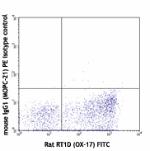- Clone
- OX-2 (See other available formats)
- Regulatory Status
- RUO
- Other Names
- OX-2, OX2
- Isotype
- Mouse IgG1, κ
- Ave. Rating
- Submit a Review
- Product Citations
- publications

-

LOU rat splenocytes were stained with anti-rat RT1D FITC and anti-rat CD200 (clone OX-2) APC (left) or mouse IgG1, κ APC isotype control (right).
| Cat # | Size | Price | Quantity Check Availability | Save | ||
|---|---|---|---|---|---|---|
| 204809 | 100 µg | 213 CHF | ||||
CD200, known as OX-2, is a type I membrane glycoprotein member of the Ig supergene family. CD200 is expressed on B cells, a subset of T cells, thymocytes, follicular dendritic cells, neurons, keratinocytes, vascular endothelium, and some smooth muscle. The interaction of CD200 with CD200 receptor provide a potent costimulatory T-cell signal in the presence of TCR signaling, stimulate macrophages, and inhibit mast cell degranulation. It was reported that increased expression of OX-2 on DC was associated with inhibition of cytokine production and renal allograft rejection. Incubation of lymphocytes with OX-2 Fc inhibits a primary mixed lymphocyte reaction in vitro, decreased IL-2 and IFN-γ production, increased IL-4 and IL-10 production. In vivo infusion of OX-2 Fc promotes both skin and renal graft survival and decreases the antibody response. The OX-2 antibody reacts with rat OX-2 antigen.
Product DetailsProduct Details
- Verified Reactivity
- Rat
- Antibody Type
- Monoclonal
- Host Species
- Mouse
- Formulation
- Phosphate-buffered solution, pH 7.2, containing 0.09% sodium azide
- Preparation
- The antibody was purified by affinity chromatography and conjugated with APC under optimal conditions.
- Concentration
- 0.2 mg/mL
- Storage & Handling
- The antibody solution should be stored undiluted between 2°C and 8°C, and protected from prolonged exposure to light. Do not freeze.
- Application
-
FC - Quality tested
- Recommended Usage
-
Each lot of this antibody is quality control tested by immunofluorescent staining with flow cytometric analysis. For flow cytometric staining, the suggested use of this reagent is ≤ 0.25 µg per million cells in 100 µL volume. It is recommended that the reagent be titrated for optimal performance for each application.
- Excitation Laser
-
Red Laser (633 nm)
- Application Notes
-
1. Dick, A.D., et al. 2001. Invest Ophthalmol. Vis. Sci. 42:170.
- RRID
-
AB_2890731 (BioLegend Cat. No. 204809)
Antigen Details
- Structure
- A 47kD (thymus) or 41-kD (brain) type I membrane glycoprotein member of the Ig supergene family. CD200 molecule contains two extracellular Ig-like domains, an Ig V-like, and an Ig C-like domain.
- Distribution
-
CD200 is expressed on B cells, a subset of T cells, thymocytes, follicular dendritic cells, neurons, vascular endothelium, and some smooth muscle.
- Function
- The interaction of CD200 with CD200 receptor provide a potent costimulatory T-cell signal in the presence of TCR signaling, stimulate macrophages, and inhibit mast cell degranulation.
- Ligand/Receptor
- CD200 receptor
- Cell Type
- B cells, Dendritic cells, Endothelial cells, Neurons, T cells, Thymocytes
- Biology Area
- Costimulatory Molecules, Immunology
- Molecular Family
- CD Molecules
- Antigen References
-
1. McMaster WR, et al. 1979. Eur. J. Immunol. 9:426
2. Barclay A. N, et al. 1981. Immunology. 44:727
3. Bukovsky A, et al. 1984. Immunol. 52:631
4. Borriello F, et al. 1997. J. Immunol. 158:4548
5. Gorczynski R. M, et al. 1999. J. Immunol. 163:1654
6. Gorczynski L, et al. 1999. J. Immunol. 162:774 - Gene ID
- 24560 View all products for this Gene ID
- UniProt
- View information about CD200 on UniProt.org
Related Pages & Pathways
Pages
Other Formats
View All CD200 Reagents Request Custom Conjugation| Description | Clone | Applications |
|---|---|---|
| PE anti-rat CD200 | OX-2 | FC |
| APC anti-rat CD200 Antibody | OX-2 | FC |
Compare Data Across All Formats
This data display is provided for general comparisons between formats.
Your actual data may vary due to variations in samples, target cells, instruments and their settings, staining conditions, and other factors.
If you need assistance with selecting the best format contact our expert technical support team.
-
PE anti-rat CD200

LOU rat splenocytes stained with OX-2 PE and RT1D (OX-17) FI... 
LOU rat splenocytes double stained with mouse IgG1 (MOPC-21)... -
APC anti-rat CD200 Antibody

LOU rat splenocytes were stained with anti-rat RT1D FITC and...
 Login / Register
Login / Register 













Follow Us